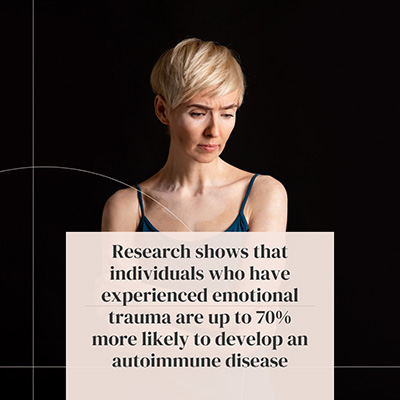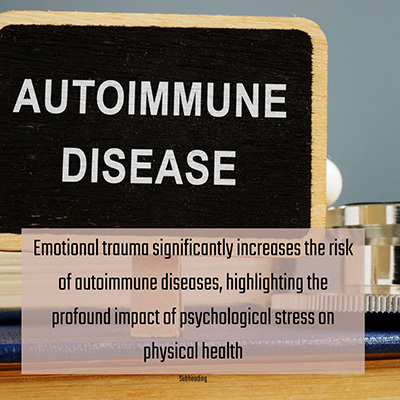
Trauma and stress are more than emotional experiences; they leave lasting imprints on the body and overall health. Research has increasingly highlighted the profound effects of early trauma and significant stress on the development of chronic diseases and autoimmune conditions in adulthood. Understanding these connections not only magnifies the importance of addressing trauma but also opens pathways to better health outcomes.
Autoimmune diseases occur when the immune system, which typically protects the body from pathogens, mistakenly attacks healthy cells. This can lead to a variety of conditions, including rheumatoid arthritis, thyroid conditions, lupus, multiple sclerosis, and more. According to the American Autoimmune Related Diseases Association (AARDA), there are over 100 known autoimmune diseases, affecting approximately 50 million Americans. Women are disproportionately affected, representing nearly 75% of autoimmune cases.

The Adverse Childhood Events (ACE) study is a landmark research project that explored the relationship between early trauma and long-term health outcomes. Conducted by the CDC and Kaiser Permanente, the ACE study surveyed over 17,000 individuals about their exposure to childhood trauma, such as abuse, neglect, and household dysfunction. The results were striking: higher ACE scores correlated with an increased risk of developing chronic diseases, mental health issues, and early death.
For example, individuals with an ACE score of 4 or higher were twice as likely to develop heart disease and cancer compared to those with an ACE score of 0. The study revealed that childhood trauma can lead to chronic stress, which in turn, affects the body's physiology and immune function.
Chronic stress initiates a cascade of physiological responses that can have detrimental effects on health. Here are some key ways stress impacts the body:

Beyond the ACE study, numerous studies have examined the relationship between stress, trauma, and health:
The evidence is clear: trauma and chronic stress are not just psychological
issues but are deeply intertwined with physical health. Early trauma can set
the stage for chronic diseases and autoimmune conditions in adulthood. By
understanding and addressing the physiological impacts of stress, we can
better support healing and health.
For those interested in further exploring these connections, the following
readings are highly recommended:
These resources offer valuable insights into the mind-body connection and
provide practical approaches for healing from trauma and stress.
If you want to further hear Dr. Meaghan talk about the connection of the mind
and body and its link to autoimmunity, listen to this episode of Holistic
Health with Dr. Meaghan on MyTalk 107.1:
7-28-24 Building an Olympian.